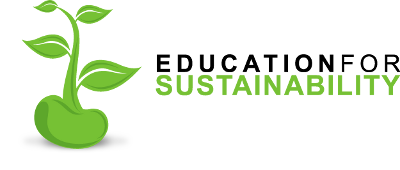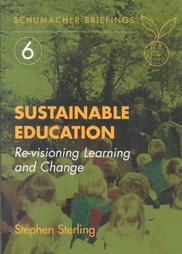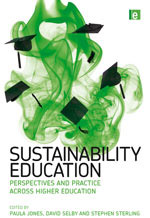
Photo: eisau.com.au
First: A bit of History
These days we hear much about “Education for Sustainability” (EfS) which is defined as a transformative learning process that equips students, teachers, and school systems with the new knowledge and ways of thinking we need to achieve economic prosperity and responsible citizenship while restoring the health of the living systems upon which our lives depend.
In 1987 the Brundtland Commission formally defined sustainable development as “development that meets the needs of the present without compromising the ability of future generations to meet their own needs”—echoing values and traditions of many cultural and geographical minorities worldwide. In 1992, at the Rio de Janeiro Earth Summit, for the first time, discussions of sustainable development paid specific attention to the educational system.
Chapter 36 of Agenda 21 of the Rio Declaration directly addresses issues of education in relation to sustainable development in four main areas: (1) improve basic education, (2) reorient existing education to address sustainable development, (3) develop public understanding, awareness, and (4) training.
Responding to the political call to implement Education for Sustainable Development, in 1994, the Earth Charter was formed to reorient educational goals with respect to Chapter 36 of Agenda 21. As a result, many organizations, educators and individuals began to refine the original goals of Agenda 21 into their own practices.
Education for Sustainability was formed out of the recognition that there is a distinct difference between “education about sustainable development and education for sustainable development.” The former was seen to be a theoretical exercise while the latter asked for the educative process to be used as a tool to achieve sustainability (The Cloud Institute for Sustainability Education).
So far so good: It is good to see- at long last- sustainability taking a centre stage. But as Sterling has candidly noted: “I acknowledge and greatly welcome the much higher profile that ‘education for sustainable development’ (ESD) has achieved in the last couple of years or so – bolstered significantly by the UN Decade of ESD – but this apparent progress may mask the deeper challenge, not least as ‘ESD’ hides an uncomfortable tension between accommodating and radical transformist approaches.”
Therefore, what is the major problem with our understanding of “Sustainability”? The problem arises when the heart of the matter, the central issue and concept, has not been defined: that is: First and foremost:
What is Sustainable Education?

“This century may well be one of relearning on a grand scale across society…necessitating a metamorphosis of many of our current education and learning constructs”
It was early 2001, and the publisher of the Schumacher Briefings and I were having a chat in his office about the title of the new education Briefing. I had just made a bid for ‘Sustainable Education’. His reply was along the lines: ‘surely, you mean “education for sustainable development”, or “education for sustainability” don’t you? Are you implying “education that lasts?” - it doesn’t make a lot of sense’.
‘No’, I said, ‘I don’t want to call it education ‘for’ anything, and yes, ‘Sustainable Education’ is exactly the title I want’. The reason I went for this title, is that I wanted it to provoke a little cognitive dissonance and the question: ‘what does that mean?’. I wanted people to move from ‘how do we educate for sustainable development’ towards deeper attention to education itself: its paradigms, policies, purposes and practices (these are linked of course) and its adequacy for the age we find ourselves in. In the Briefing, I define sustainable education as:
“a change of educational culture, one which develops and embodies the theory and practice of sustainability in a way which is critically aware. It is therefore a transformative paradigm which values, sustains and realises human potential in relation to the need to attain and sustain social, economic and ecological well being, recognising that they must be part of the same dynamic” (Sterling, 2001:22).
I came to this position through some 30 years of working in environmental and sustainability education – increasingly realising that sustainability logically necessitates a deep learning response in educational thinking and practice as it does in myriad other human activities, whether economics and business, design and construction, agriculture and energy, trade and aid, health and so on. Ever since the United Nations Conference on the Human Environment (Stockholm, 1972) education has been identified in international conferences, reports and agreements as key to addressing environment and development issues. Yet, over three decades later, most education still makes little or no reference to these issues. At the same time, sustainability issues are becoming ever more critical. It seems education is a slow learner! In fact, I would argue that formal education largely remains part of the problem of unsustainability. I acknowledge and greatly welcome the much higher profile that ‘education for sustainable development’ (ESD) has achieved in the last couple of years or so – bolstered significantly by the UN Decade of ESD – but this apparent progress may mask the deeper challenge, not least as ‘ESD’ hides an uncomfortable tension between accommodating and radical transformist approaches.
We need to recognise the underlying factors and ideas which still make most educational practice a servant of the past, and – importantly – articulate a persuasive and practicable alternative. As regards the first challenge, I would point to the continuing influence of reductionism, objectivism, materialism and dualism allied to an uncritical and growth-oriented consumerist culture. These ideas might not be consciously recognised by most practising educators, but they are no less powerful. They are part of the subterranean geology of education, invisible but reflected in the educational landscape above the surface: single disciplines, separate departments, abstract and bounded knowledge, belief in value-free knowing, privileging of cognitive/intellectual knowing over affective and practical knowing, transmissive pedagogy, analysis over synthesis, and so on.
As regards the second challenge, I argue that we need an educational culture and practice adequate and appropriate to the volatile, densely interconnected, and dangerously vulnerable world that we have created. Instead of educational thinking and practice that tacitly assumes that the future is some kind of linear extension of the past, we need what I call an anticipative education, recognising the new conditions and discontinuities which face present generations, let alone future ones: the massive challenges of global warming, species extinction, economic vulnerability, social fragmentation and migration, endemic poverty, the end of cheap energy, and more positively, the rise of localism, participative democracy, green purchasing, ethical business, and efforts to achieve a low carbon economy. The heart of such an education is an ecological orientation. Other descriptors which help capture this sense are ‘holistic’, ‘systemic’ and ‘participative’; they indicate a redesigned educational paradigm that is in essence relational, engaged, ethically oriented, and locally and globally relevant.
Mary Catherine Bateson suggests:
“Our machines, our value systems, our educational systems will all have to be informed by (the) switch, from the machine age when we tried to design schools to be like factories, to an ecological age, when we want to design schools, families and social institutions in terms of maintaining the quality of life, not just for our species, but for the whole planet” (Bateson, 1997:84).
Hence, the concept of ‘sustainable education’, a term which suggests not just a simple ‘add-on’ of sustainability concepts to some parts of the curriculum, but a cultural shift in the way we see education and learning. Rather than a piecemeal, bolt-on, fragmentary response which leaves the mainstream otherwise untouched, it implies systemic change in thinking and practice, informed by what can be called more ecological thinking and values – essentially a new paradigm emerging around the poles of holism, systemic thinking, sustainability and complexity. This offers the possibility of education that is appropriate and responsive to the new systemic conditions of uncertainty and complexity that are reflected in the headlines everyday; one that nurtures the increasingly important qualities of adaptability, creativity, self-reliance, hope and resilience in learners.
In writing the 2001 Briefing Sustainable Education, I tried to indicate why we need to critique the narrow instrumentalism and managerialism that has affected so much educational thinking and practice. I outlined the possibility of a unifying theory of education and learning which integrates the best of past liberal education practice with the newer emphases on transformative learning, capacity building, creativity and adaptive management that are considered part of the new sustainability agenda, and suggested steps to help achieve constructive change at all levels.
Sustainable education implies four descriptors: educational policy and practice which is sustaining, tenable, healthy and durable.
- Sustaining: it helps sustain people, communities and ecosystems;
- Tenable: it is ethically defensible, working with integrity, justice, respect and inclusiveness;
- Healthy: it is itself a viable system, embodying and nurturing healthy relationships and emergence at different system levels;
- Durable: it works well enough in practice to be able to keep doing it.
There is nothing particularly mysterious about this. In the nineties imposition of managerial and economist values on education, evidenced in the whole panoply of endless testing, inspection, precise learning outcomes, performance indicators, marketisation and so on, and in the disillusion and mounting stress levels that accompanied this drive, we were in danger of losing our sense of authentic education, of caring, of community, of engagement, of empowerment and meaningful purpose. Consequently, an ecological view implies putting relationship back into education and learning - seeking synergy and coherence between all aspects of education: ethos, curriculum, pedagogy, management, procurement and resource use, architecture and community links. The emphasis is on such values as respect, trust, participation, community, ownership, justice, participative democracy, openness, sufficiency, conservation, critical reflection, emergence and a sense of meaning: an education which is sustaining of people, livelihoods and ecologies.
Unfortunately, the term ‘sustainable education’, with a few welcome exceptions, has often been bundled in by writers as synonymous with ‘sustainability education’, ‘education for sustainability’ and ‘ESD’. These terms represent worthy developments but do not necessarily connote the need for deep change in educational values, assumptions and practices. In response to the crisis of unsustainability, most educators – and increasingly, politicians - will ask ‘what learning needs to take place amongst students?’. This is a perfectly valid and important question, but it begs a prior and deeper question: what changes, and what learning needs to take place amongst policymakers, amongst senior management, amongst teachers, lecturers, support staff, amongst parents, amongst employers, etc., so that education itself can be more transformative and appropriate to our times?
The first question stays within what learning theorists call first order change, that is, more of the same: change which doesn’t affect the system as a whole. But what if the system itself needs changing? This invokes at least second order change which involves a re-examination of assumptions - towards a shift of consciousness, a changed intelligence which is both connective and collective. This is a deeper and systemic learning response, which needs to happen in three areas: personal, organisational and the community (social learning beyond formal education). The most resistant area is change in the institution and organisation but this is being squeezed by growing awareness of individuals at one level; and evident shifts in social values and behaviours at the level of community and public debate.
Envisioning this change and taking realisable, practicable steps in our own working contexts is key. In essence, what we all are engaged in here is a critically important second order ‘learning about learning’ process; one which will directly affect the chances of a more sustainable future for all. As a United Nations Educational, Scientific and Cultural Organisation (UNESCO) report points out (2002), just as we have learnt to live unsustainably, we now need to learn how to live sustainably. Such learning for respons-ibility requires educational systems, institutions and educators to develop response-ability – that is, the competence and will to address the considerable challenge and opportunity that sustainability presents. This is the context for any meaningful discussion about the role of education in the 21st century.
References
Bateson, MC (1997) ‘Understanding Natural Systems’, in Zelov, C & Cousineau, P Design Outlaws on the Ecological Frontier, Knossus Publishing, Philadelphia.
Sterling, S (2001) Sustainable Education – Re-Visioning Learning and Change, Schumacher Society Briefing no. 6, Green Books, Dartington.
Williams, R (2004) See Change: Learning and education for sustainability, New Zealand Parliamentary Commission for the Environment.
UNESCO (2002) Education for Sustainability – From Rio to Johannesburg: Lessons learnt from a decade of commitment, UNESCO, Paris.
The Article above was written by Stephen Stering:
Sterling, S (2008) 'Sustainable education - towards a deep learning response to unsustainability', Policy & Practice: A Development Education Review, Vol. 6, Spring, pp. 63-68.
See the original article:
Read more:
Globalisation and Education for the Common Good: A Path to Sustainability, Well-being and Happiness
Small is Beautiful: The Wisdom of E.F. Schumacher
Sustainable Development Goals: Where is the Common Good?
Sustainable People=Sustainable World: Discover Your Inner Ecology
A highly recommended book:

Sustainability Education: Perspectives and Practice Across Higher Education. Edited by Paula Jones, David Selby & Stephen Sterling. Earthscan, London, 2010. 364pp.
How do we equip learners with the values, knowledge, skills, and motivation to help achieve economic, social and ecological well being? How can universities make a major contribution towards a more sustainable future? Amid rising expectations on HE from professional associations, funding bodies, policy makers, and undergraduates, and increasing interest amongst academics and senior management, a growing number of higher education institutions are taking the lead in embracing sustainability. This response not only includes greening the campus but also transforming curricula, teaching and learning.
This book explains why this is necessary and - crucially - how to do it, distilling out the curriculum contribution, actual and potential, of a wide range of disciplinary areas to sustainability.
The first part of the book provides background on the current status of sustainability within higher education, including chapters discussing interdisciplinarity, international perspectives and pedagogy. The second part features thirteen case studies from lecturers in diverse disciplines, describing what has worked, how and why - and what hasn't. Whilst the book is organized by traditional disciplines, the authors and editors emphasize transferable lessons and interdisciplinary opportunity so that readers can learn from examples outside their own area in embedding sustainability within their own curricula and teaching.
